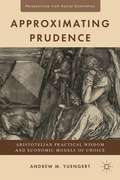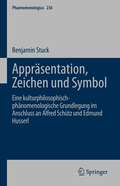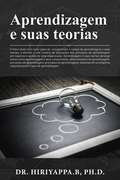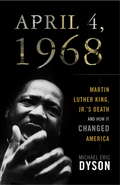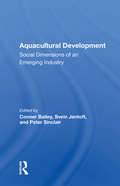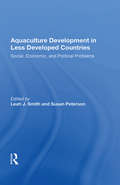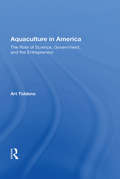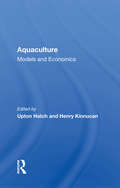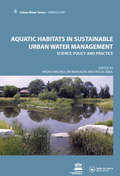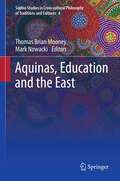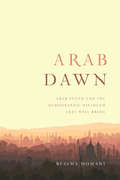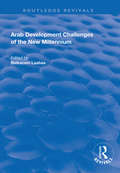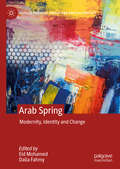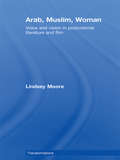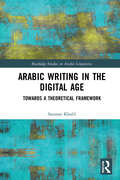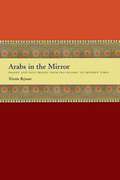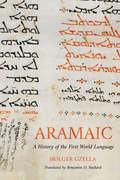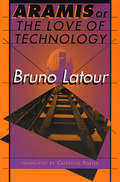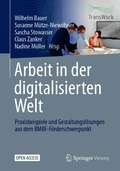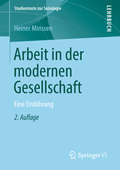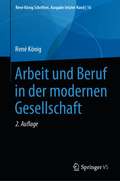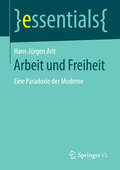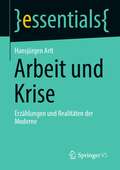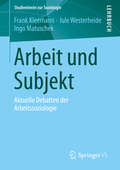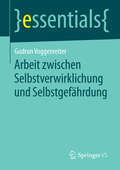- Table View
- List View
Approximating Prudence
by Andrew M. YuengertIn a unique undertaking, Andrew Yuengert explores and describes the limits to the economic model of the human being, providing an alternative account of human choice, to which economic models can be compared.
Appräsentation, Zeichen und Symbol: Eine kulturphilosophisch-phänomenologische Grundlegung im Anschluss an Alfred Schütz und Edmund Husserl (Phaenomenologica #236)
by Benjamin StuckAppräsentation gehört zu den Schlüsselkonzepten im Werk des Philosophen und Begründers der Phänomenologie Edmund Husserl (1859–1938) und des ihm nachfolgenden Alfred Schütz (1899–1959). In dem Buch bringt der Autor die Ergebnisse ihrer lebenswelttheoretischen Forschung zusammen und systematisiert ihre Überlegungen zur Appräsentation – dem Mitgegebensein von etwas, das eigentlich nicht da ist. Dies nimmt er zum Ausgangspunkt, um sich mit der kulturphilosophischen These auseinanderzusetzen, nach der menschliche Erfahrung kulturell geprägt ist. Das Erklärungspotenzial der transzendentalphänomenologischen Tradition Husserls und der mundanphänomenologischen Tradition von Schütz demonstriert der Autor an zwei Beispielen aus der Kulturphilosophie und der Kultursoziologie. Was leistet also das Konzept der Appräsentation im Detail und wie kann es helfen kulturelle Sinnkonstitution zu beschreiben? Um diese Frage zu beantworten, wird im ersten Teil des Werks zunächst die Phänomenologie an die Logik der Kulturwissenschaften angeknüpft, um dann die Bedeutung appräsentativer Beziehungen bei Husserl zu klären – beispielsweise für das Bewusstsein von Zeit, der Horizontstruktur von Erfahrungen oder Einfühlung. Im nächsten Schritt legt der Autor den Stellenwert von Appräsentationsbeziehungen im Werk von Schütz offen. Er fragt nach ihren Dimensionen, wie sie in Schütz‘ weit ausdifferenzierten Symbol- und Zeichentheorie zum Ausdruck kommt, anhand derer er Kulturalität und Sozialität phänomenologisch beschreibt. Die Analyse bringt zweierlei hervor: die Bedeutung des appräsentativen Mitdaseins von Erfahrungsaspekten und die komplexe appräsentative Relation von unterschiedlichen Sinnschemata als Grundelement kultureller Sinnsetzung. Diese erste Monographie zum Thema der Appräsentation und der appräsentativen Beziehungen erscheint in der Buchreihe Phaenomenologica. Das Werk richtet sich an Studierende und Forschende aus den Geistes- und Sozialwissenschaften mit Interesse an Phänomenologie, soziologischer Theorie oder Kulturphilosophie.
Aprendizagem e suas teorias
by Hiriyappa BAprendizagem e suas teorias por Hiriyappa B ; Ph.D. O leitor deste livro será capaz de: compreender o campo da aprendizagem e suas teorias; e discutir o real cenário de aplicações dos princípios de aprendizagem em negócios e gestão de uma organização. Aprendizagem e suas teorias abrange temas como aprendizagem e seus componentes, determinantes de aprendizagem, processos de aprendizagem, princípios de aprendizagem, sistemas de recompensa organizacional e tipos de aprendizagem. O leitor deste livro será capaz de: compreender o campo da aprendizagem e suas teorias; e discutir o real cenário de aplicações dos princípios de aprendizagem em negócios e gestão de uma organização. Este livro é um guia seletivo simples, uma monografia prática, concebido para ajudar acadêmicos e estudantes de psicologia, educação e gestão de negócios. A aprendizagem traz mudanças permanentes em seus processos ao longo de nossas vidas. Gênero: Negócios & Economia/Comportamento organizacional Gênero secundário: Negócios & Economia/Educação Língua: Português Palavras-chave: Investimento em conhecimento, dinheiro, gestão da informação, manual de referência educacional, livro de mão sobre negócios, gestão, desenvolvimento de negócios, aprendizagem de planejamento em negócios, comportamento organizacional, princípios de aprendizagem, teorias de aprendizagem Quantidade de palavras: 5.500 Amostra de texto: Aprendizagem e suas teorias abrange temas como aprendizagem e seus componentes, determinantes de aprendizagem, processos de aprendizagem, princípios de aprendizagem, sistemas de recompensa organizacional e tipos de aprendizagem. O leitor deste livro será capaz de: compreender o campo da aprendizagem e suas teorias; e discutir o real cenário de aplicações dos princípios de aprendizagem em negócios e gest
April 4, 1968: Martin Luther King Jr.'s Death and How It Changed America
by DysonOn April 4, 1968, at 6:01 p. m. , while he was standing on a balcony at a Memphis hotel, Martin Luther King Jr. was shot and fatally wounded. Only hours earlier King ended his final speech with the words, "I may not get there with you, but I want you to know tonight, that we as a people will get to the Promised Land. ” Acclaimed public intellectual and best-selling author Michael Eric Dyson examines how King fought, and faced, his own death, and how America can draw on his legacy in the twenty-first century. April 4, 1968 celebrates the leadership of Dr. King, and challenges America to renew its commitment to his vision.
Aquacultural Development: Social Dimensions Of An Emerging Industry
by Svein Jentoft Peter Sinclair Conner BaileyIn this volume, an international group of contributors explores the newly emerging aquaculture industry. Focusing on the social and environmental dimensions of aquacultural development in both industrialized and nonindustrialized nations, they examine issues of social equity, user-group conflict, environmental impacts of production, and the mediating role of the state. They also discuss aquaculture's role in development activity-especially in sustainable development, where it can enhance community viability, coherence, and solidarity. Asserting the need for careful planning and recognizing impending political and moral choices, the contributors assess the decisionmaking process for public authorities and development agencies and consider the social consequences of these decisions. Policymakers responsible for promoting and managing this growing industry will find this volume invaluable as they begin to research and design appropriate institutional structures. In addition, scholars interested in the overall adoption and diffusion of new technologies will find here a rich source of information about a system that shares attributes with but also differs significantly from agricultural and fisheries production systems.
Aquaculture Development In Less Developed Countries: Social, Economic, And Political Problems
by Leah SmithAquaculture may not be the panacea for the world's food problems, but It has the potential to make important contributions to diet and incomes in some areas. This book, intended to improve planning for further development of aquaculture, examines the factors that can determine the success or failure of aquaculture projects in developing countries.
Aquaculture In America: The Role Of Science, Government, And The Entrepreneur
by Art TiddensTiddens' job is to track (one might suspect, to advance) the financial prospects for American companies cultivating aquatic plants and animals. He surveys the support currently available from state and federal governments and scientific institutions and urges that more is needed.
Aquaculture: Models And Economics
by Upton HatchPresenting state-of-the-art research on the economics of producing and marketing aquacultural products, this volume addresses critical issues concerning profitability, market acceptance, and economic modeling of various aquacultural products. Research approaches range from firm-level bioeconomic modelling to market-level econometric modelling of industry growth and product substitution. The studies highlight the institutional structures and public policy issues that will shape growth and development of aquaculture into the twenty-first century, including trade policies, food safety, and environmental quality.
Aquatic Habitats in Sustainable Urban Water Management: Urban Water Series - UNESCO-IHP
by Iwona Wagner; Jiri Marsalek; Pascal BreilAquatic habitats supply a wide range of vital ecosystem benefits to cities and their inhabitants. The unsustainable use of aquatic habitats, including inadequate urban water management itself, however, tends to alter and reduce their biodiversity and therewith diminish their ability to provide clean water, protect us from waterborne diseases and po
Aquinas, Education and the East (Sophia Studies in Cross-cultural Philosophy of Traditions and Cultures #4)
by Mark Nowacki Thomas Brian MooneyA confluence of scholarly interest has resulted in a revival of Thomistic scholarship across the world. Several areas in the investigation of St. Thomas Aquinas, however, remain under-explored. This volume contributes to two of these neglected areas. First, the volume evaluates the contemporary relevance of St. Thomas's views for the philosophy and practice of education. The second area explored involves the intersections of the Angelic Doctor's thought and the numerous cultures and intellectual traditions of the East. Contributors to this section examine the reception, creative appropriation, and various points of convergence between St. Thomas and the East.
Arab Dawn
by Bessma MomaniIn the West, news about the Middle East is dominated by an endless stream of reports and commentary about civil war, sectarian violence, religious extremism, and economic stagnation. But do they tell the full story? For instance, who knew that university enrolment in the war-torn Palestinian territories exceeds that of Hong Kong, or that more than a third of Lebanese entrepreneurs are women?Change is on its way in the Middle East, argues Bessma Momani, and its cause is demographic. Today, one in five Arabs is between the ages of fifteen and twenty-four. Young, optimistic, and increasingly cosmopolitan, their generation will shape the region's future. Drawing on interviews, surveys, and other research conducted with young people in fifteen countries across the Arab world, Momani describes the passion for entrepreneurship, reform, and equality among Arab youth. With insightful political analysis based on the latest statistics and first-hand accounts, Arab Dawn is an invigorating study of the Arab world and the transformative power of youth.
Arab Development Challenges of the New Millennium
by Belkacem LaabasThis title was first published in 2002. In 2000, a major international conference was organized by the Arab Planning Institute to identify, analyze and compare development challenges facing Arab countries at the dawn of the new millennium. An interdisciplinary team of scholars were brought together from the fields of regional science, development studies, economics, business and government policy and together they addressed global, regional and domestic challenges and their impact on the Arab region. This volume brings together the best papers presented at this conference. In doing so, it offers up-to-date insights into, and a clearer understanding of this region. It highlights issues including: economic and social implications of globalization; strategic alliances; the implications for Arab countries of emerging technological patterns; the impact of the European Monetary Union and the euro; Arab regional integration; education; and the development of individual Arab country's economies.
Arab Spring: Modernity, Identity and Change (Critical Political Theory and Radical Practice)
by Eid Mohamed Dalia FahmyThis book provides systematic, integrated analyses of emergent social and cultural dynamics in the wake of the so-called Arab Spring, and looks closely at the narratives and experiences of a people as they confront crisis during a critical moment of transition. Providing an interdisciplinary approach to interconnections across regional and communal boundaries, this volume situates itself at the intersection of political science, cultural studies, media and film studies, and Middle Eastern studies, while offering some key critical revisions to dominant approaches in social and political theory. Through the unique contributions of each of its authors, this book will offer a much-needed addition to the study of Middle East politics and the Arab Spring. Moreover, although its specific focus is on the Arab context, its analysis will be of issues of significant relevance to a changing world order.
Arab, Muslim, Woman: Voice and Vision in Postcolonial Literature and Film (Transformations)
by Lindsey MooreGiven a long history of representation by others, what themes and techniques do Arab Muslim women writers, filmmakers and visual artists foreground in their presentation of postcolonial experience? Lindsey Moore’s groundbreaking book demonstrates ways in which women appropriate textual and visual modes of representation, often in cross-fertilizing ways, in challenges to Orientalist/colonialist, nationalist, Islamist, and ‘multicultural’ paradigms. She provides an accessible but theoretically-informed analysis by foregrounding tropes of vision, visibility and voice; post-nationalist melancholia and mother/daughter narratives; transformations of ‘homes and harems’; and border crossings in time, space, language, and media. In doing so, Moore moves beyond notions of speaking or looking ‘back’ to encompass a diverse feminist poetics and politics and to emphasize ethical forms of representation and reception. Aran, Muslim, Woman is distinctive in the eclectic body of work that it brings together. Discussing Algeria, Egypt, Jordan, Lebanon, Morocco, the Palestinian territories, and Tunisia, as well as postcolonial Europe, Moore argues for better integration of Arab Muslim contexts in the postcolonial canon. In a book for readers interested in women's studies, history, literature, and visual media, we encounter work by Assia Djebar, Mona Hatoum, Fatima Mernissi, Ahlam Mosteghanemi, Nawal el Saadawi, Leila Sebbar, Zineb Sedira, Ahdaf Soueif, Moufida Tlatli, Fadwa Tuqan, and many other women.
Arabic Writing in the Digital Age: Towards a Theoretical Framework (Routledge Studies in Arabic Linguistics)
by Saussan KhalilThe written and spoken forms of Arabic have been traditionally viewed as separate forms of the language that rarely overlap in writing, but this book will examine the recently emerged concept of ‘mixed’ writing that combines both written and spoken forms. This book takes a close look at different examples of mixed Arabic writing in modern (twentieth to twenty-firstt century) print and online literature, offering an analysis of this type of mixing alongside a dynamic model for analysing mixed Arabic writing, and the motivations for producing this type of writing. This book further introduces the ground-breaking concept of the seven writing styles for Arabic, ranging from Classical Arabic to ChatSpeak, whilst also offering an overview of early Arabic literacy and children’s literature. Primarily aimed at Arabic researchers and teachers in linguistics, sociolinguistics, identity studies, politics and Teaching Arabic as a Foreign Language, this book would also be informative for undergraduate and postgraduate students studying Arabic as foreign language, Arabic linguistics and dialectology.
Arabs in the Mirror
by Nissim RejwanWhat is an Arab? Though many in the West would answer that question with simplistic stereotypes, the reality is far more complex and interesting. Arabs themselves have been debating Arab identity since pre-Islamic times, coming to a variety of conclusions about the nature and extent of their "Arabness. " Likewise, Westerners and others have attempted to analyze Arab identity, reaching mostly negative conclusions about Arab culture and capacity for self-government. To bring new perspectives to the question of Arab identity, Iraqi-born scholar Nissim Rejwan has assembled this fascinating collection of writings by Arab and Western intellectuals, who try to define what it means to be Arab. He begins with pre-Islamic times and continues to the last decades of the twentieth century, quoting thinkers ranging from Ibn Khaldun to modern writers such as al-Ansari, Haykal, Ahmad Amin, al-'Azm, and Said. Through their works, Rejwan shows how Arabs have grappled with such significant issues as the influence of Islam, the rise of nationalism, the quest for democracy, women's status, the younger generation, Egypt's place in the Arab world, Israel's role in Middle Eastern conflict, and the West's "cultural invasion. " By letting Arabs speak for themselves, Arabs in the Mirror refutes a prominent Western stereotype--that Arabs are incapable of self-reflection or self-government. On the contrary, it reveals a rich tradition of self-criticism and self-knowledge in the Arab world.
Aramaic: A History of the First World Language (Handbook Of Oriental Studies. Section 1 The Near And Middle East Ser. #111)
by Holger GzellaIn this volume—the first complete history of Aramaic from its origins to the present day—Holger Gzella provides an accessible overview of the language perhaps most well known for being spoken by Jesus of Nazareth. Gzella, one of the world&’s foremost Aramaicists, begins with the earliest evidence of Aramaic in inscriptions from the beginning of the first millennium BCE, then traces its emergence as the first world language when it became the administrative tongue of the great ancient Near Eastern empires. He also pays due diligence to the sacred role of Aramaic within Judaism, its place in the Islamic world, and its contact with other regional languages, before concluding with a glimpse into modern uses of Aramaic. Although Aramaic never had a unified political or cultural context in which to gain traction, it nevertheless flourished in the Middle East for an extensive period, allowing for widespread cultural exchange between diverse groups of people. In tracing the historical thread of the Aramaic language, readers can also gain a stronger understanding of the rise and fall of civilizations, religions, and cultures in that region over the course of three millennia. Aramaic: A History of the First World Language is visually supplemented by maps, charts, and other images for an immersive reading experience, providing scholars and casual readers alike with an engaging overview of one of the most consequential world languages in history.
Aramis, or the Love of Technology
by Bruno LatourBruno Latour has written a unique and wonderful tale of a technological dream gone wrong. As the young engineer and professor follow Aramis' trail--conducting interviews, analyzing documents, assessing the evidence--perspectives keep shifting: the truth is revealed as multilayered, unascertainable, comprising an array of possibilities worthy of Rashomon. The reader is eventually led to see the project from the point of view of Aramis, and along the way gains insight into the relationship between human beings and their technological creations. This charming and profound book, part novel and part sociological study, is Latour at his thought-provoking best.
Arbeit in der digitalisierten Welt: Praxisbeispiele und Gestaltungslösungen aus dem BMBF-Förderschwerpunkt
by Susanne Mütze-Niewöhner Sascha Stowasser Wilhelm Bauer Claus Zanker Nadine MüllerDas vorliegende Open-Access-Buch umfasst Beiträge aus 29 Verbundvorhaben sowie dem begleitenden Verbundprojekt „TransWork“. Im Rahmen des Förderschwerpunkts „Arbeit in der digitalisierten Welt“ des Bundesministeriums für Bildung und Forschung wurden in den Projekten Entwicklungen im Transformationsprozess der Arbeitswelt analysiert, Lösungsansätze entwickelt und diese wissenschaftlich begleitet. In den Beiträgen werden Einblicke in die erarbeiteten Erkenntnisse und entwickelten Konzepte der Projekte gegeben. Hieraus lassen sich für Akteure aus Politik und Wirtschaft Handlungsempfehlungen ableiten und es ergeben sich neue Forschungsimpulse für die Wissenschaft.
Arbeit in der modernen Gesellschaft: Eine Einführung (Studientexte zur Soziologie)
by Heiner MinssenEin zentrales Problem für jede Erwerbsorganisation ist die Transformation von Arbeitskraft in Arbeit; schließlich ist durch den Abschluss eines Arbeitsvertrages allein noch keineswegs sichergestellt, dass Arbeitnehmer auch wie gewünscht arbeiten. Lange Zeit wurde versucht, dieses Problem durch engmaschige Kontrollen zu lösen, doch mittlerweile macht sich die Auffassung breit, dass es ein effizienterer Weg ist, die Arbeitnehmer selbst verantwortlich zu machen für ihre Arbeitsleistung. Dahinter verbirgt sich eine Leitlinie, die typisch ist für die moderne Gesellschaft: im Finanzmarkt-Kapitalismus zählt nur, was sich am Markt bewährt.
Arbeit und Beruf in der modernen Gesellschaft (René König Schriften. Ausgabe letzter Hand #16)
by René KönigDer Sammelband vereint Aufsätze und Vorträge von René König, die ihn nicht nur als Fachwissenschaftler ausweisen, sondern auch seinen Anspruch nach öffentlichkeitswirksamer Verbreitung soziologischer Erkenntnisse unterstreichen. In den Texten wird "Arbeit" in ihrer anthropologischen Bedeutung und in ihren Struktur bildenden Wirkungen entfaltet: Als ein soziologischer Grundbegriff, der in der Modernen Gesellschaft mit "Beruf" und "Organisation" verknüpft ist. René König verbindet die sozialwissenschaftliche Strukturanalyse konsequent mit soziologischer Aufklärung: In allen Schriften geht es ihm auch um die Abwehr sozialphilosophisch inspirierter Fehldeutungen und Bewertungen der gesellschaftlichen Gegenwart, der er die Forderung nach soziologischer Analyse entgegensetzt. Dadurch sind viele seiner Texte auch heute noch von großer Aktualität.
Arbeit und Freiheit: Eine Paradoxie der Moderne (essentials)
by Hans-Jürgen ArltIn diesem essential beschreibt Hans-Jürgen Arlt das Paradox unserer modernen Gesellschaft, die Freiheit als ihren höchsten Wert feiert und verteidigt, aber mit der Arbeitstätigkeit eine Lebenspraxis in ihr Zentrum stellt, die in der Regel unfreiwillig und fremdbestimmt ausgeübt wird. Dieses Paradox nimmt das essential zum Anlass aufzuzeigen, wie die Moderne in die Arbeitsgesellschaft hineingeriet und wie sie herauskommen kann. Der Arbeit ohne Ende mit Wachstumszwang, Konsumsucht und sozialer Spaltung wird ein Szenario gegenüber gestellt, das die Kollektivität der Arbeit mit individuellen Freiheitsrechten versöhnt. Statt auf das Recht des Stärkeren oder die Verstaatlichung der Arbeit zu setzen, wird für ein Freiheitsverständnis plädiert, dem es auf das reflektierte Verhältnis von Bindung und Unabhängigkeit ankommt. Skizziert wird eine Wirtschaftsweise, die besser zu leben und weniger zu arbeiten als egalitäres, nicht nur als elitäres Programm realisiert.
Arbeit und Krise: Erzählungen und Realitäten der Moderne (essentials)
by Hansjürgen ArltKrisenphänomene von psychischer Depression und Burnout über Arbeitslosigkeit, Schuldenberge und Börsencrashs bis zu Massenflucht und Umweltzerstörung alarmieren unsere Gegenwartsgesellschaft – die gleichzeitig Höchstleistungen auf vielen Gebieten feiert und ihren Reichtum genießt. Wohlstandsquelle und Krisenherd sind identisch: die moderne Ordnung der gesellschaftlichen Arbeit. Eingebettet in ein liberal-maskulines Verständnis von Freiheit und Gleichheit treibt die bewirtschaftete, besonders die kapitalistisch instrumentalisierte Arbeit in persönliche, soziale, ökonomische und ökologische Krisenlagen. Das essential erläutert strukturelle Hintergründe von Krisenereignissen des 21. Jahrhunderts und beschreibt, wie affirmative Erzählungen Realitäten moderner Arbeit überlagern und trivialisieren.
Arbeit und Subjekt: Aktuelle Debatten der Arbeitssoziologie (Studientexte zur Soziologie)
by Frank Kleemann Ingo Matuschek Jule WesterheideDie Arbeits- und Industriesoziologie erfasst aktuelle Wandlungsprozesse der Arbeitswelt in einer großen Bandbreite von Themen und Analyseebenen. Das vorliegende Lehrbuch konzentriert sich auf arbeitssoziologische Perspektiven, bei denen der Wandel der Qualität von Arbeit für die arbeitenden Subjekte ein zentrales Thema ist. Dazu ist die Einbeziehung von Meso- und Makrostrukturen erforderlich: Betriebliche und überbetriebliche Entwicklungen, einschließlich gesellschaftlicher Reproduktionsprozesse und Geschlechterverhältnisse, werden in Ihren Auswirkungen auf die Qualität von Arbeit und auf die Subjekte erfasst. Das Lehrbuch fokussiert darauf, wie gesellschaftliche Realentwicklungen im arbeitssoziologischen Diskurs in den Blick genommen werden.
Arbeit zwischen Selbstverwirklichung und Selbstgefährdung (essentials)
by Gudrun VoggenreiterArbeit ist in einem umfassenden Verständnis die Vorbedingung allen Lebens, ist Leben doch durch Bewegung und damit Veränderung, Umgestaltung definiert. Der Mensch möchte sein Selbst in eben diesen Umgestaltungen wiedererkennen, er möchte Spuren hinterlassen. Dabei kommt er häufig in Konflikt mit dem Wollen der Anderen - Arbeit wird mühsam. Der Weg von der Selbstverwirklichung zur Selbstgefährdung ist vorgezeichnet. In den letzten Jahrzehnten scheint sich dies zu verschärfen. Die Rückbesinnung auf die Sinn-Dimension von Arbeit und die Umgestaltung einiger betriebswirtschaftlicher und politischer Rahmenbedingungen wären ein großer Beitrag zur Gesundheit einer Gesellschaft. Vorschläge dazu werden in der vorliegenden Arbeit vorgestellt. Es deutet einiges darauf hin, dass ein Umbau unserer Arbeits- und Lebenswelten erforderlich ist, der durchaus die Grundfesten unserer jetzigen Gesellschaftsordnung und individuellen Überzeugung berühren wird.
